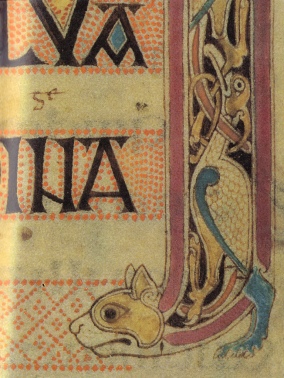It’s November! I’m back to brighten your blahs with a poem in the November issue of Heroic Fantasy Quarterly.
“Gæscligcymblingas” is my tribute to Edward Gorey’s “Gashleycrumb Tinies,” mashed up with Old English literature. Because, as we all know, the only class of characters more prone to ghastly death than Victorian children are Anglo-Saxon heroes. All the names in my poem are references to Old English literature. Since some of them are pretty obscure, I thought I’d make a cheat sheet and put it here.
Alhwin was Charlemagne’s chancellor Alcuin of York. That’s what they would have called him back in his English hometown. He wrote a poem for his own epitaph, which reads, in part, “now I am ashes and dust, food for worms.”
Ælfred, in this case, is not King Alfred but Ælfred Ætheling, a prince and son of Æthelred the Unready. In 1036 he attempted to ride to the aid of his mother, who had been dispossessed by his step-brother Harold Harefoot, but he was betrayed by certain nobles of the realm, captured and blinded. The Anglo-Saxon Chronicle contains a poem about the incident.
Byrhtnoth is the hero of the Old English poem “The Battle of Maldon“. The battle ended badly for him.
Cynewulf was a king of Wessex who was stabbed to death in a woman’s bedroom in 755.
Dufenal was Donald III, king of Scotland. In 1094 (1093 according to the Anglo-Saxon Chronicle), he was deposed by his nephew Duncan, who led an army of Frenchmen and English.
Eormanric is a cruel king who features in the Old English poem “Deor“. The poem’s refrain is Þæs ofereode, þisses swa mæg, “That passed; so can this.”
Finn’s in-laws feature in Beowulf and the Finnesburh Fragment. When Finn the Friesian’s brother in law Hnaef came to visit, along with his men, there was a falling out between the families and Hnaef was slain. Since it was too late in the season to return safely to Denmark, the survivors were obliged to swear fealty to Finn and co-exist awkwardly with his people for an entire winter, until they exacted bloody revenge the following spring.
Grendel should be familiar to everyone as the villain of the epic poem Beowulf.
Hrothgar is the Danish king who seeks Beowulf’s help to slay Grendel.
Iohannes is the Latin name for John, in this case John the Baptist, who features in Ælfric’s Homilies.
Juliana is the subject of an entire Old English poem.
King Harthacnut was the Danish king of England from 1040 to 1042. According to the Anglo-Saxon Chronicle, he died suddenly while drinking.
Pope Leo III was violently expelled from the holy see in 799 (797, according to the Anglo-Saxon Chronicle).
Beowulf: The Monsters and the Critics was a lecture delivered at Oxford in 1936 that changed the way scholars viewed Beowulf. The lecturer was a certain J.R.R. Tolkien, who would later become more famous for some of his other work.
Nynian or Ninian is the saint credited with converting the southern Picts of Scotland.
Ottuel d’Avranches was the tutor of the sons of King Henry I. He drowned with them in the wreck of the White Ship in 1120. Reportedly, everyone on board was drunk.
Peada, son of Penda, was a seventh-century king of the Mercians. The Anglo-Saxon Chronicle claims that his wife was responsible for his death, but it doesn’t provide details of her betrayal, or even name her.
Quentovic, or Cwentovic, was a Frankish town raided by Vikings in the ninth century.
The Ruin is another poem in the Old English corpus.
The Sparrow: The Venerable Bede famously wrote that earthly life is like the brief flight of a sparrow through a mead hall on a stormy winter’s night.
Tostig was the Anglo-Saxon earl of Northumbria who lost the Battle of Stamford Bridge, and his life, in 1066.
Ðeodric is another king in the poem “Deor”. He passed, so may this.
Þryðhild is known only to history because she gave her name to a place. Thredling Hundred in Suffolk is thought to have been known originally as Thrythhildings’ Hundred.
Ulfcytel had a bad day fighting the Danes at the Battle of Ashingdon in 1016 when one of his fellow ealdormen started a rout and the English army was defeated.
Vikings should be self-explanatory.
The Waymundings, or Wægmundings, were Beowulf’s clan. In the last part of his epic poem he fights a dragon, and his clansmen prove not to be as helpful as they might have been.
Exiles are really a theme in Old English literature. In this case, I was thinking of the poem “The Wanderer“.
Ysopa accompanied his king Æthelwold on an ill-fated raid against Mercia and died when his party was cut off by enemies. The incident comes up in the Anglo-Saxon Chronicle under the year 905.
Zoomorphic Grotesque: This one’s from the Lindisfarne Gospels.

Pingback: Black Gate » Articles » December Short Story Roundup